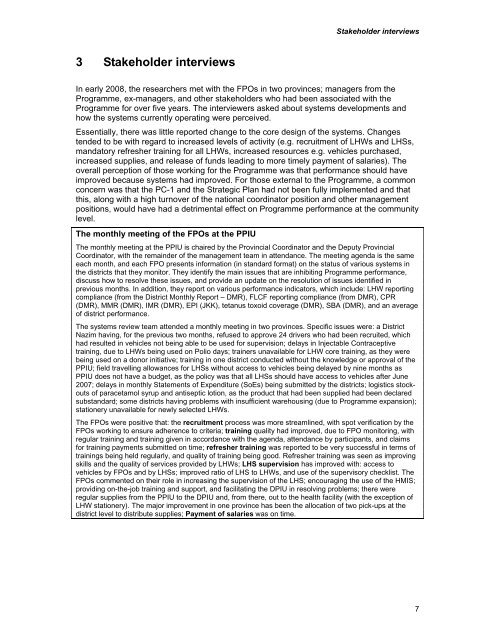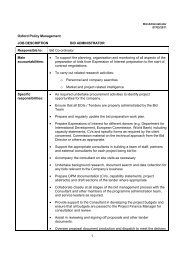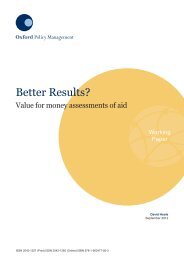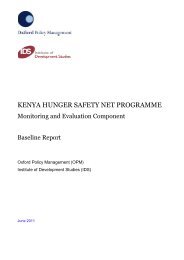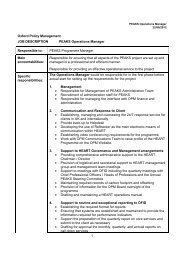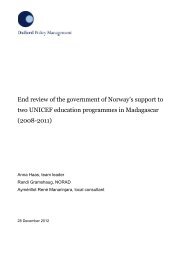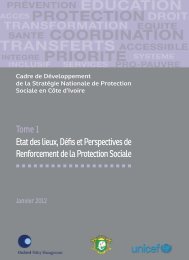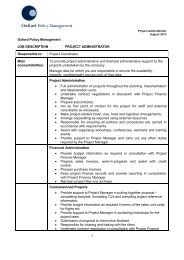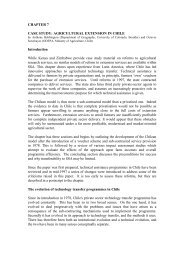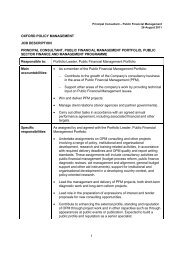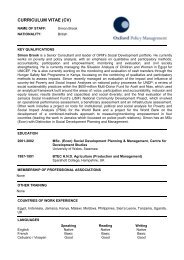LHW Systems Review - Oxford Policy Management
LHW Systems Review - Oxford Policy Management
LHW Systems Review - Oxford Policy Management
You also want an ePaper? Increase the reach of your titles
YUMPU automatically turns print PDFs into web optimized ePapers that Google loves.
Stakeholder interviews3 Stakeholder interviewsIn early 2008, the researchers met with the FPOs in two provinces; managers from theProgramme, ex-managers, and other stakeholders who had been associated with theProgramme for over five years. The interviewers asked about systems developments andhow the systems currently operating were perceived.Essentially, there was little reported change to the core design of the systems. Changestended to be with regard to increased levels of activity (e.g. recruitment of <strong>LHW</strong>s and LHSs,mandatory refresher training for all <strong>LHW</strong>s, increased resources e.g. vehicles purchased,increased supplies, and release of funds leading to more timely payment of salaries). Theoverall perception of those working for the Programme was that performance should haveimproved because systems had improved. For those external to the Programme, a commonconcern was that the PC-1 and the Strategic Plan had not been fully implemented and thatthis, along with a high turnover of the national coordinator position and other managementpositions, would have had a detrimental effect on Programme performance at the communitylevel.The monthly meeting of the FPOs at the PPIUThe monthly meeting at the PPIU is chaired by the Provincial Coordinator and the Deputy ProvincialCoordinator, with the remainder of the management team in attendance. The meeting agenda is the sameeach month, and each FPO presents information (in standard format) on the status of various systems inthe districts that they monitor. They identify the main issues that are inhibiting Programme performance,discuss how to resolve these issues, and provide an update on the resolution of issues identified inprevious months. In addition, they report on various performance indicators, which include: <strong>LHW</strong> reportingcompliance (from the District Monthly Report – DMR), FLCF reporting compliance (from DMR), CPR(DMR), MMR (DMR), IMR (DMR), EPI (JKK), tetanus toxoid coverage (DMR), SBA (DMR), and an averageof district performance.The systems review team attended a monthly meeting in two provinces. Specific issues were: a DistrictNazim having, for the previous two months, refused to approve 24 drivers who had been recruited, whichhad resulted in vehicles not being able to be used for supervision; delays in Injectable Contraceptivetraining, due to <strong>LHW</strong>s being used on Polio days; trainers unavailable for <strong>LHW</strong> core training, as they werebeing used on a donor initiative; training in one district conducted without the knowledge or approval of thePPIU; field travelling allowances for LHSs without access to vehicles being delayed by nine months asPPIU does not have a budget, as the policy was that all LHSs should have access to vehicles after June2007; delays in monthly Statements of Expenditure (SoEs) being submitted by the districts; logistics stockoutsof paracetamol syrup and antiseptic lotion, as the product that had been supplied had been declaredsubstandard; some districts having problems with insufficient warehousing (due to Programme expansion);stationery unavailable for newly selected <strong>LHW</strong>s.The FPOs were positive that: the recruitment process was more streamlined, with spot verification by theFPOs working to ensure adherence to criteria; training quality had improved, due to FPO monitoring, withregular training and training given in accordance with the agenda, attendance by participants, and claimsfor training payments submitted on time; refresher training was reported to be very successful in terms oftrainings being held regularly, and quality of training being good. Refresher training was seen as improvingskills and the quality of services provided by <strong>LHW</strong>s; LHS supervision has improved with: access tovehicles by FPOs and by LHSs; improved ratio of LHS to <strong>LHW</strong>s, and use of the supervisory checklist. TheFPOs commented on their role in increasing the supervision of the LHS; encouraging the use of the HMIS;providing on-the-job training and support, and facilitating the DPIU in resolving problems; there wereregular supplies from the PPIU to the DPIU and, from there, out to the health facility (with the exception of<strong>LHW</strong> stationery). The major improvement in one province has been the allocation of two pick-ups at thedistrict level to distribute supplies; Payment of salaries was on time.7


